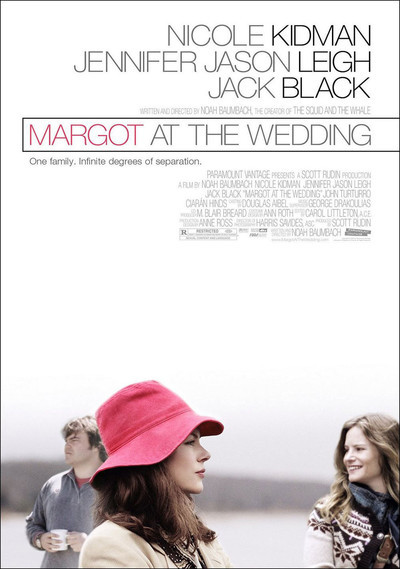Post by Return of the Thin Olive Duke on Sept 16, 2016 10:49:24 GMT -5

Margot at the Wedding
Dir. Noah Baumbach
Premiered November 16, 2007
Not to be confused with Rachel Getting Married, which came out the following year. It’s an easy mistake.
Noah Baumbach’s career is fascinating to me. A protégé of the legendary but little-seen Whit Stillman, Baumbach made a splash with his Stillmanesque 1995 debut Kicking and Screaming, but floundered for nearly a decade as he attempted to find his place among his more irony-obsessed peers. In 2004, he stunned critics with his melodrama The Squid and the Whale, putting him on a path toward becoming a millennial darling. Many filmmakers (Woody Allen for example) seem to aspire to have lived and worked in a bygone past; rare is the director who embraces the spirit of a younger age. Today, Baumbach is a filmmaker out of time, the voice of a generation that is not his own– a position he explores in his films Greenberg and While We’re Young.
Margot at the Wedding was not a terribly promising step toward that fate. A naturalistic, aggressively un-flashy character dramedy, it has more in common with the then-burgeoning Mumblecore movement. The titular Margot (Nicole Kidman) is a successful Manhattan author invited to the Long Island wedding of her younger sister Pauline (Jennifer Jason Leigh) to shiftless artist Malcolm (Jack Black). Away from their parents and youngest sister, Margot goes on a rampage; her Cinderella complex, inability to keep secrets, and habit of non-professionally diagnosing strangers with autism drives a wedge between Pauline and Malcolm, further antagonizes their redneck neighbors, and motivates her to seek an affair with her writing partner Dick Koosman (Ciarán Hinds). Meanwhile, Margot’s taciturn son Claude (Zane Pais) bonds with his cousin (Flora Cross) and fantasizes about Koosman’s older daughter (Halley Feiffer).
The film excels in its casting. Kidman, Leigh, and Black are exactly the actors one might imagine while reading the script. Black was mocked at the time for what seemed like an attempt at respectability, but Malcolm doesn’t seem far off from his usual persona, which fits surprisingly well into a dramatic context. Kidman gives what might be her most loathsome performance, and I mean that as a compliment, as a selfish control freak who fixates on familial misfortune and mines it for material.
In aggregate, however, Margot at the Wedding is a flat, dour experience with no semblance of tone, and a meandering, borderline-irrelevant plot. The film was nominated for several indie awards, but was coolly received by critics. Suffice it to say that Noah Baumbach moved on to better things, and so will we.
Eventually.
Sign This Was Made in 2007
One of the main characters contemplates moving to Williamsburg, Brooklyn at the end of the film. “Did you know people live there now?”
Next Time: Mr. Magorium's Wonder Emporium
Dir. Noah Baumbach
Premiered November 16, 2007
Not to be confused with Rachel Getting Married, which came out the following year. It’s an easy mistake.
Noah Baumbach’s career is fascinating to me. A protégé of the legendary but little-seen Whit Stillman, Baumbach made a splash with his Stillmanesque 1995 debut Kicking and Screaming, but floundered for nearly a decade as he attempted to find his place among his more irony-obsessed peers. In 2004, he stunned critics with his melodrama The Squid and the Whale, putting him on a path toward becoming a millennial darling. Many filmmakers (Woody Allen for example) seem to aspire to have lived and worked in a bygone past; rare is the director who embraces the spirit of a younger age. Today, Baumbach is a filmmaker out of time, the voice of a generation that is not his own– a position he explores in his films Greenberg and While We’re Young.
Margot at the Wedding was not a terribly promising step toward that fate. A naturalistic, aggressively un-flashy character dramedy, it has more in common with the then-burgeoning Mumblecore movement. The titular Margot (Nicole Kidman) is a successful Manhattan author invited to the Long Island wedding of her younger sister Pauline (Jennifer Jason Leigh) to shiftless artist Malcolm (Jack Black). Away from their parents and youngest sister, Margot goes on a rampage; her Cinderella complex, inability to keep secrets, and habit of non-professionally diagnosing strangers with autism drives a wedge between Pauline and Malcolm, further antagonizes their redneck neighbors, and motivates her to seek an affair with her writing partner Dick Koosman (Ciarán Hinds). Meanwhile, Margot’s taciturn son Claude (Zane Pais) bonds with his cousin (Flora Cross) and fantasizes about Koosman’s older daughter (Halley Feiffer).
The film excels in its casting. Kidman, Leigh, and Black are exactly the actors one might imagine while reading the script. Black was mocked at the time for what seemed like an attempt at respectability, but Malcolm doesn’t seem far off from his usual persona, which fits surprisingly well into a dramatic context. Kidman gives what might be her most loathsome performance, and I mean that as a compliment, as a selfish control freak who fixates on familial misfortune and mines it for material.
In aggregate, however, Margot at the Wedding is a flat, dour experience with no semblance of tone, and a meandering, borderline-irrelevant plot. The film was nominated for several indie awards, but was coolly received by critics. Suffice it to say that Noah Baumbach moved on to better things, and so will we.
Eventually.
Sign This Was Made in 2007
One of the main characters contemplates moving to Williamsburg, Brooklyn at the end of the film. “Did you know people live there now?”
Next Time: Mr. Magorium's Wonder Emporium

